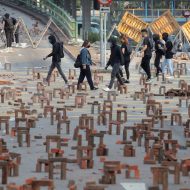“In the military sense of the term what after all is a street? A street is a defile in the city. A defile is a narrow pass through which troops can only move by narrowing their front, and therefore making themselves a good target for the enemy. A street is a defile the sides of …
Category Archives: General
The Riot Manual
General. Riots can cause tremendous damage to capitalist power, and can raise the fighting spirit of poor and working people. Riots can politicize individuals, empower them, and alter their understanding of what is possible in the realm of resistance. More than any other aspect of revolutionary warfare, riots involve the largest numbers of people.
Marxism and Insurrection, by Lenin
To be successful, insurrection must rely not upon conspiracy and not upon a party, but upon the advanced class. That is the first point. Insurrection must rely upon a revolutionary upsurge of the people. That is the second point. Insurrection must rely on that turning point in the history of the growing revolution when the …
Planning Insurgent Actions
General. Careful and detailed planning is a prerequisite for successful insurgencies.
Intelligence Operations
Definition. Intelligence is information of value to a mission; the goal of intelligence operations is to collect such information. The focused collection of information, the transformation of that information into intelligence, the analysis of that intelligence and its dissemination to the correct people at the correct time is an art, the function of which is …
Logistics
Logistical Requirements. Logistical requirements of the clandestine organization are rudimentary and simple when compared to a conventional force of similar size. These requirements, in general, consist of— Living necessities, such as housing, food, clothing, shoes, shelter, and medical equipment. Basic equipment for the conduct of insurgent operations. Major categories are—fuel, lighters, glass bottles, crowbars, rocks, …
Principles of Security
General. Any struggle or movement that poses a serious threat to capitalism and the established order will come under attack by the state. It will face police surveillance, infiltration, disinformation campaigns, cooptation, criminalization, incarceration, and even assassinations. While outright state violence is easy to recognize, surveillance and cooptation are less obvious and much more effective …
Auxiliary Forces
General. “Auxiliary” is a term used to denote people engaged a variety of activities which help the revolutionary insurgents. The term applies to those who are not full-blown insurgents, but who knowingly and willingly participate in the insurgency by engaging in activities such as—political mobilization, recruitment, media, intelligence (including surveillance), logistics, psychological warfare, evasion and …
The Need for Strategic Analysis
The “enemy” is only a relevant category in the context of a material conflict between opposing forces, that is, in relation to the dynamics of a particular structure, in a particular space, at a particular time. These concrete dynamics should dictate how, where, and when we fight.
War of the Flea, by Robert Taber
The Wind of Revolution: Popular Will as the Key to Strategy The will to revolt seems to express a newly awakened consciousness, not of “causes” but of potentiality. It is a spreading awareness of the possibilities of human existence, an entirely new attitude toward life, that the conditions of life that had seemed immutable can, …
